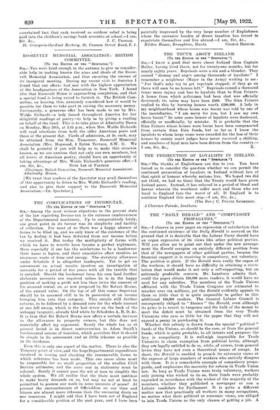THE COMPLICATIONS OF INCOME-TAX.
[To THE EDITOR OF THE " SPECTATOR.") Sta,—Among the most serious objections to the present state of the law regarding Income-tax is the extreme cumbrousness of the Departmental machinery. Up to comparatively lately, one great point in its favour was its simplicity and facility of collection. For most of us there was a happy absence of forms to be tilled up, and we only knew of the existence of the tax by finding it had been deducted from our income before we received it. But to-day the multiplicity of forms with which we have to wrestle have become a perfect nightmare. More especially if one has the misfortune to be a landowner their name is legion, and their cumulative effect involves an enormous waste of time and eneigy. The statutory allowance under Schedule A is altogether inadequate. Yet to get an assessment on actual results involves an investigation of accounts for a period of five years with all the trouble that is entailed. Should the landowner farm his own land further elaborate accounts are required unless he is in the happy position of making a profit not less than twice the amount of his assessed rental, or, as now proposed by Sir Robert Horne, of the annual value. On the top of all this comes Super-tax should he be assumed still to be in possession of an income bringing him into that category. This entails still further returns, to be followed by a demand note for the whole amount at one fell swoop, which is the last straw on the back of the unhappy taxpayer, already bled white by Schedules A, B, D, &c. It is true that Sir Robert Horne now offers a certain increase in the allowance to property owners, but this does not materially affect my argument. Surely the whole tax as at present levied is in direct contravention to Adam Smith's fundamental canons of taxation, which postulate that it should be simple in its assessment and as little irksome as possible in its incidence.
Even this is only one aspect of the matter. There is also the Treasury point of view,and the hugeDepartmental expenditure involved in issuing and checking the' innumerable forms to which reference has been made. This one cause alone must be responsible for no small proportion of the swollen Civil Service estimates, and the mere cost in stationery must be colossal. Surely it cannot pass the wit of man to simplify the whole system. We all realize that the State must continue to make heavy demands on us, but may we not at least be permitted to possess our souls in some measure of peace? At present the encroachments of Officialdom on our time and leisure are almost more irksome than the unceasing drain on our resources. I might add that I have been out of England for a considerable portion of the past year, and I have been painfully impressed by the very large number of Englishmen whom the excessive burden of direct taxation has forced to expatriate themselves and live abroad.—I am, Sir, &c.,
Hildon House, Broughton, Hants. GEORGE BRISCOE.


































 Previous page
Previous page